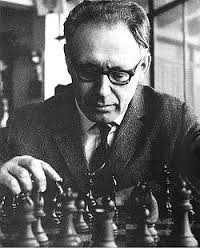Mikhail Botvinnik (17 August 1911 - 5 May, 1995)

World Champion 1948-1957, 1958-1960, 1961-1963. Born in St. Petersburg, Botvinnik became the first Soviet master to dominate in the chess world. He is considered to be the founder of the Soviet chess school.
Botvinnik learned to play in 1923 at the age of twelve. After barely three years, he was already one of the strongest players in Leningrad. In 1927, after being invited as a replacement in the 5th USSR Championship in Moscow, he finished joint fifth and gained the master title. In 1931 he graduated in electrical engineering at the Leningrad Polytechnic Institute. Botvinnik, starting in 1931, won the National Championship seven times (in 1931, 1933,
1939,
1941,
1944, 1945 and 1952).
In the following years, Soviet players were allowed to compete with foreign players and as a result, Botvinnik was one of the first to gain international prominence. He drew a match with
Flohr in 1933 and in 1934 won a tournament in which the international players Euwe and Kmoch also participated. After a disappointment at Hastings 1934/5, several successes established Botvinnik as a world class grandmaster. Equal first at
Moscow 1935, second at Moscow 1936, shared first at Nottingham 1936, were amongst these results.
In the supertournament in Holland,
AVRO 1938 Botvinnik could only manage third place, a point behind Keres and Fine. Despite this, his wins over Alekhine and Capablanca fuelled his claim to be considered a World Championship candidate.
During the war, Botvinnik worked in the Urals and in the Molotov High-tension Laboratory, as an electrical engineer. From 1943, he was allowed time off to participate in tournaments and he won both the National Championships during wartime. Botvinnik was the winner in
Groningen 1946 - the first important post-war tournament.
Alekhine's death freed the World Champion Title and in 1948 FIDE organised a match for this title. This match was held between the five leading contenders - Botvinnik, Smyslov, Keres, Reshevsky and Euwe. Botvinnik finished in clear first place, 3 points ahead of the second-placed Smyslov.
After winning the World Championship, Botvinnik returned to his studies. He obtained a doctorate in 1951. He played virtually no serious games till 1951, when he
defended his title against Bronstein in a match which resulted in a draw (+5 -5 =14). He thus retained his title. Between 1951 and 1954, his play did not offer much success, with the exception of winning the 20th USSR Championship in 1952 after a play-off with Taimanov. In 1954, Botvinnik
defended his title against Smyslov, with another drawn match, allowing him to retain his title for a further three years. He was
dethroned in 1957, in another match with Smyslov, though in the following year's
return match he regained the title.
In 1960, he
lost the title again to the young Tal, only to
regain it in 1961 in the return match.
In 1963, he lost the title for the final time to Petrosian. A new ruling by FIDE prevented Botvinnik from playing a return match and he did not like the idea of having to qualify through the 1965 Candidates matches. During Botvinnik's reign as World Champion, opening thoery and technique in general improved considerably and the differences in strength among the leading players diminished greatly.
After his loss of the World Title, Botvinnik continued to make his presence felt in tournaments and team events. In 1970 he retired from active play, preferring to occupy his time developing computer chess programs and assisting with the training of younger Soviet players.
Botvinnik died of pancreatic cancer in May 1995. Amongst his obvious achievements, he has earned the nickname of
Patriarch of the Soviet Chess School.